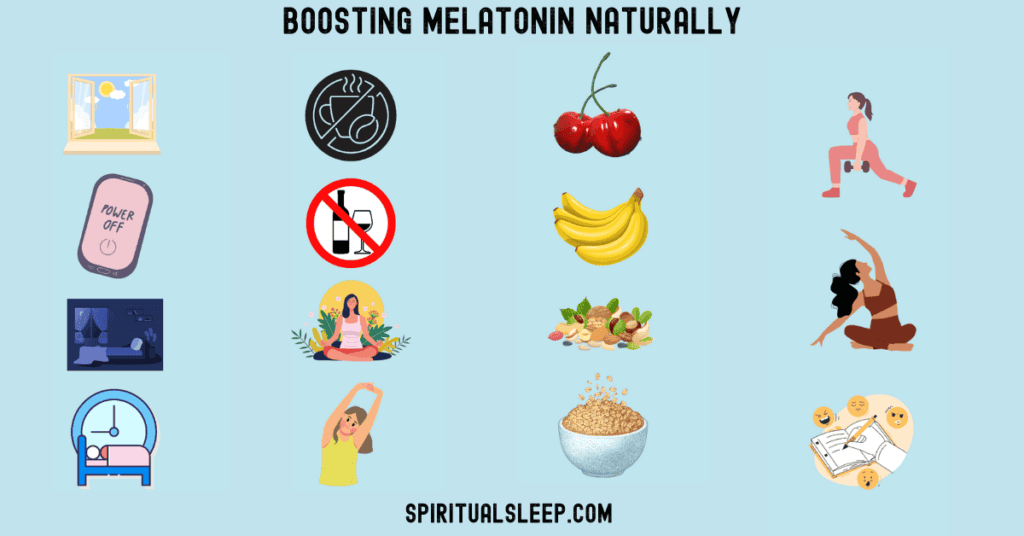How to Increase Melatonin Naturally for Better Sleep
Table of Contents
Sleep is essential for physical health, mental well-being, and overall quality of life. However, many people struggle to get enough sleep due to various factors such as stress, anxiety, and unhealthy lifestyle habits. One important hormone that plays a crucial role in regulating the sleep cycle is melatonin.. Known as the “sleep hormone,” melatonin helps signal to your body when it’s time to wind down and rest.
As a doctor interested in sleep, I have seen countless patients struggle with sleep issues. Many have found relief by focusing on boosting melatonin levels naturally. In this post, I will guide you through science-backed strategies to help you increase melatonin naturally, leading to better sleep. You’ll learn practical, easy-to-implement ways to improve melatonin production and sleep hygiene.
Poor Sleep and Melatonin Deficiency
Before diving into how to boost melatonin, let’s first understand why you may need to increase it.
Melatonin is a hormone produced by the pineal gland in the brain in response to darkness. It helps regulate your body’s sleep-wake cycle, the circadian rhythm. When melatonin levels are low, falling asleep and staying asleep can become difficult. Factors such as artificial light exposure at night, irregular sleep schedules, and high stress levels can disrupt melatonin production, leading to poor sleep.
Many of my patients have experienced this firsthand. They often complain about trouble falling asleep or waking up frequently throughout the night, especially after using screens before bed or having irregular sleep patterns. In my practice, I recommend simple, natural strategies that can effectively increase melatonin production.

Boosting Melatonin Naturally
1.Control Your Light Exposure
Light is the most significant factor influencing melatonin production. Exposure to natural light during the day increases melatonin levels in the evening, making it easier to fall asleep at night. On the other hand, artificial light, incredibly blue light emitted by screens, suppresses melatonin production.
In my experience, many patients overlook the impact of light on sleep quality. I recommend starting with a simple habit: try to get outside in natural daylight in the morning for at least 20–30 minutes. This helps signal to your brain that it’s daytime, thus boosting melatonin production later in the evening.
Avoid exposure to bright lights at night, particularly blue light from smartphones, computers, and televisions. Using dim lighting and avoiding screens an hour before bedtime can help increase melatonin levels naturally.
2. Sleep in a Dark Environment
The darker your sleep environment, the better your melatonin production. As melatonin is triggered by darkness, making your bedroom as dark as possible during the night is essential.
Consider using blackout curtains or an eye mask to block out any light. In my clinical experience, this minor adjustment can significantly affect patients with trouble sleeping, especially in areas with street lights or early morning sunlight. Even the faintest light can disrupt melatonin secretion, so aim for a completely dark environment for optimal sleep.
3. Adopt a Consistent Sleep Schedule
Maintaining a consistent sleep-wake schedule is critical for melatonin regulation. When you go to bed and wake up simultaneously every day, your body becomes attuned to this rhythm, and melatonin levels rise and fall predictably.
I encourage patients to follow a routine, even on weekends. If you go to bed at varying times, your body’s internal clock can get thrown off, disrupting melatonin production. Consistency is key. Ideally, aim for 7–9 hours of sleep per night.
4. Limit Caffeine and Alcohol
Caffeine is a stimulant that can interfere with melatonin production, and alcohol may disrupt your sleep cycle despite its sedative effects. Many people don’t realize how these substances impact their ability to get a restful night’s sleep.
I recommend limiting caffeine consumption, particularly in the afternoon and evening. Caffeine can stay in your system for up to 6 hours, affecting your ability to fall asleep. Similarly, while alcohol may make you feel drowsy initially, it can disrupt your sleep cycle and suppress melatonin production later in the night.
5. Relax Before Bed
Creating a relaxing pre-bedtime routine is an excellent way to signal your body to prepare for sleep. Relaxation techniques like meditation, deep breathing exercises, or gentle stretching can lower cortisol levels (the stress hormone), allowing melatonin to rise and help you sleep.
I have recommended techniques such as progressive muscle relaxation or guided imagery to help patients unwind. These techniques reduce stress and anxiety, two significant factors that can inhibit melatonin production.
6. Include Melatonin-Rich Foods in Your Diet
Certain foods naturally contain melatonin or encourage its production. These include cherries, bananas, oats, and nuts. Consuming these foods in the evening can give your body the raw materials it needs to produce melatonin and improve your sleep quality.
Cherries, particularly tart cherries, are known for their high melatonin content. Studies have shown that drinking tart cherry juice before bed can increase melatonin levels and improve sleep duration. Bananas contain magnesium and potassium, which promote muscle relaxation and help you wind down, while nuts like almonds and walnuts provide healthy fats that support melatonin production.
7. Practice Stress Management Techniques
Chronic stress and anxiety can suppress melatonin production by elevating cortisol levels. To combat this, practicing stress management techniques is crucial. I often recommend mindfulness practices such as meditation, yoga, or journaling to patients who experience high stress.
A study found that mindfulness and meditation can reduce cortisol and promote melatonin production, leading to better sleep. Incorporating stress-reducing practices into your daily routine can significantly support melatonin production and improve sleep quality.
8. Exercise Regularly
Moderate physical activity during the day can boost melatonin levels and improve your ability to fall asleep at night. Research shows that people who exercise regularly experience deeper, more restful sleep, as exercise helps regulate melatonin secretion.
However, timing is essential—try to avoid intense exercise right before bed, as it may have the opposite effect and make it harder for you to wind down. In my personal experience as a sleep coach, many patients who incorporated light-to-moderate exercise into their daily routine noticed a significant improvement in their sleep quality.
9. Try Supplements (When Needed)
Melatonin supplements are widely available, but I only recommend them as a last resort after other natural methods have been exhausted. Low-dose melatonin supplements (around 0.5 to 1 milligram) taken 30–60 minutes before bed can help reset the sleep-wake cycle, particularly in cases of jet lag or shift work.
However, it is important to consult with a healthcare provider before starting melatonin supplements. In my clinical experience, the best approach is to implement lifestyle changes and diet adjustments to see if melatonin levels improve naturally.
Medical Disclaimer: This article is based on thorough research, scientific studies, and my personal experience as a medical doctor interested in sleep health. This content is for informational purposes only and should not be considered medical advice. Each individual’s sleep needs and health conditions are unique. I recommend consulting with a healthcare professional or sleep specialist to address specific concerns for better sleep.
The Bottom Line: Enhancing Melatonin for Better Sleep
Increasing melatonin naturally is a powerful tool for improving sleep quality. Simple lifestyle changes—such as optimizing light exposure, creating a consistent sleep schedule, incorporating melatonin-rich foods, and reducing stress—can significantly enhance melatonin production and sleep health.
As a medical professional, I have seen firsthand how small changes can significantly impact sleep. By adopting these strategies, you’ll improve your melatonin levels and develop healthier sleep habits that will benefit your overall well-being.
References
- Arendt, J. (2005). Melatonin and the Mammalian Pineal Gland. NeuroScience Letters, 389(2), 57–62.
- Zhdanova, I. V., et al. (2001). Melatonin as a sleep-promoting agent. Current Pharmaceutical Design, 7(3), 203-209.
- Lemoine, P., et al. (2014). Effects of exercise on sleep: a systematic review of randomized controlled trials. Sleep Medicine Reviews, 18(6), 427-438.
- Burgess, H. J., & Eastman, C. I. (2005). The effects of bright light and melatonin on the human circadian rhythm. Journal of Clinical Sleep Medicine, 1(2), 145-152.
- Chtourou, H., et al. (2012). Effects of chronic psychological stress on sleep: A review. Journal of Sleep Research, 21(4), 459-467.






https://t.me/Martin_officials